I had the privilege of visiting Japan’s Gifu Prefecture, specifically the town of Yaotsu, where the residents erected the Memorial Hall and the Hill of Humanity Park in honor of Chiune Sugihara.
In Gifu Prefecture, a remarkable effort has been made to meticulously preserve an original document—a passport that bears both a Curaçao visa and a Sugihara visa. Survivor Sylvia Smoller generously donated this priceless artifact.
A replica of this document is prominently displayed within the hall. In the vicinity, at Jindounooka Park, which aptly translates to the “Hill of Humanity,” a bust of Chiune Sugihara stands as a testament to his enduring legacy.
The definition of a “hero” aligns perfectly with Chiune Sugihara, a person admired and idealized for his courage, accomplishments, and willingness to make sacrifices that encompassed his career, future, family, and even his own life. For Sugihara, turning a blind eye to the desperate situation of refugees to safeguard himself and his family was not an option, even if it meant jeopardizing his own safety. Refusing to grant the refugees the signed visas would have essentially been like delivering signed death warrants to them. Faced with the agonizing choice between protecting his loved ones and aiding hundreds of strangers, Sugihara made the selfless decision to prioritize the latter, ultimately rescuing thousands of Jewish refugees.
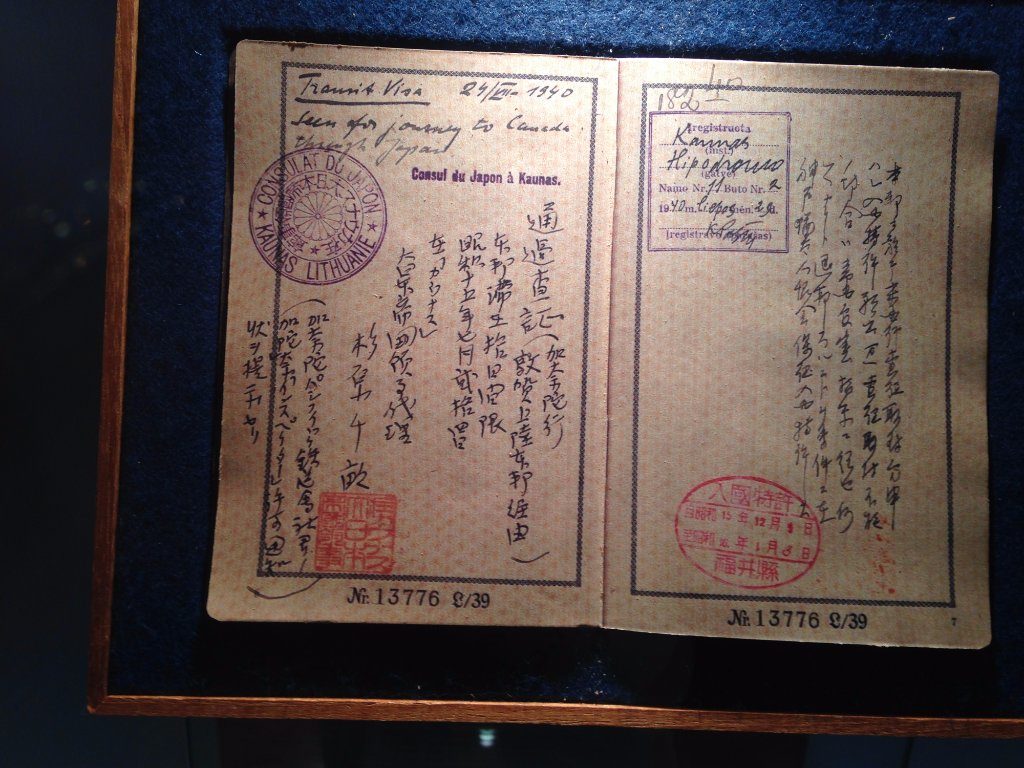
Transit visa- Chiune Sugihara – New York Jewish Travel Guide
Sugihara’s captivating and extraordinary life story began in March 1939, as Europe teetered on the brink of World War II. Assigned to establish a consulate in Kaunas, Lithuania, Sugihara had barely settled into his new role when the German army invaded Poland. This invasion triggered a wave of 15,000 Jewish refugees flooding into Lithuania, bringing with them horrifying accounts of German atrocities. Trapped between the Nazis and the Soviets, these refugees were in desperate need of a means to emigrate. The Soviets only allowed people with transit visas from Japan to enter through Russia, making getting a Japanese visa a matter of life or death.
However, when Lithuania was incorporated into the Soviet Union in the summer of 1940, all foreign diplomats were instructed to vacate Kaunas. Faced with this dire situation, the Jewish delegation turned to Sugihara with a desperate plea. With immigration visas to other countries seemingly impossible to obtain, Curacao, a Dutch colony that did not demand entry visas, emerged as the only viable option. Japanese transit visas were the key to gaining permission to traverse the Soviet Union and reach the port of Vladivostok, from where the Jewish refugees could embark on their journey westward. Sugihara found himself in an agonizing position, surrounded by women, children, and elderly individuals whose eyes were filled with desperation.
He lacked the authority to issue visas without Tokyo’s consent. Undaunted, he made three impassioned appeals to his government, requesting permission to grant the visas, but each time, his entreaties were met with denial.
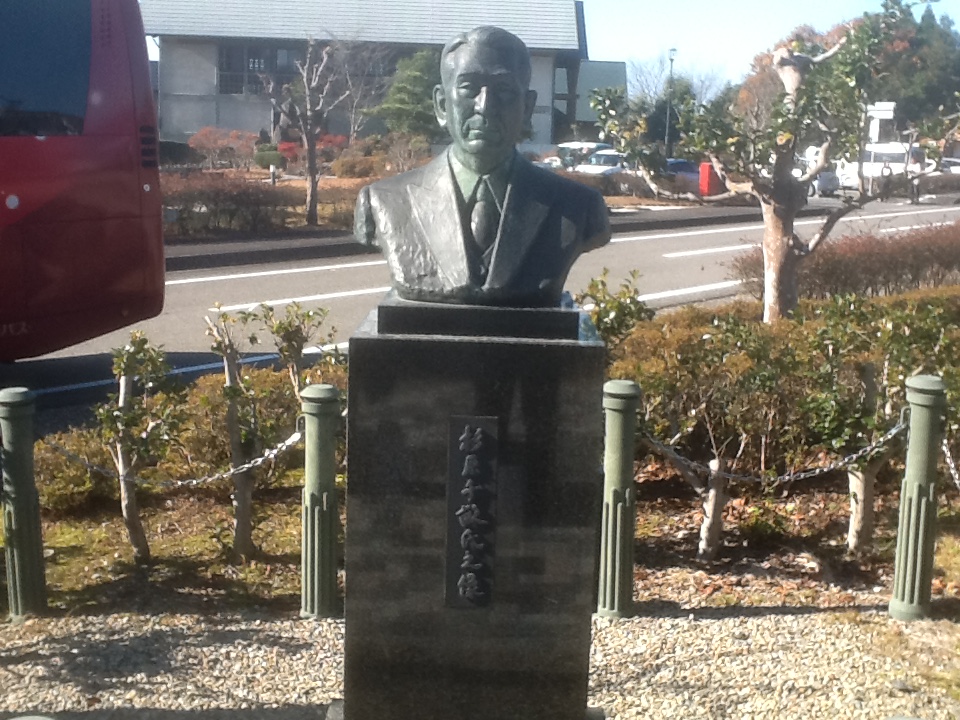
Chiune Sugihara, New York Jewish Travel Guide
Faced with the desperate refugees who had gathered outside his home seeking assistance, Sugihara boldly defied his government’s directives and knowingly endangered both himself and his family.
His unwavering moral convictions served as his compass as he painstakingly hand-wrote and granted hundreds of visas to these Jewish refugees.
For a span of 29 days, he sat tirelessly, composing these transit visas.
Day after day, hour after hour, he meticulously wrote and signed 300 visas, each one entirely by hand. By the time he was compelled to leave Kaunas, thousands of Jewish refugees had received these vital documents. Remarkably, even as Sugihara’s train was departing the city, he continued to write visas from the open window of the moving train. As the train gained speed, he handed the visa stamp to a refugee to carry on the task.
“We will never forget you” were the last words Sugihara heard from the refugees. In response, Sugihara shouted, “Please forgive me. I cannot write anymore. I wish you the best.”
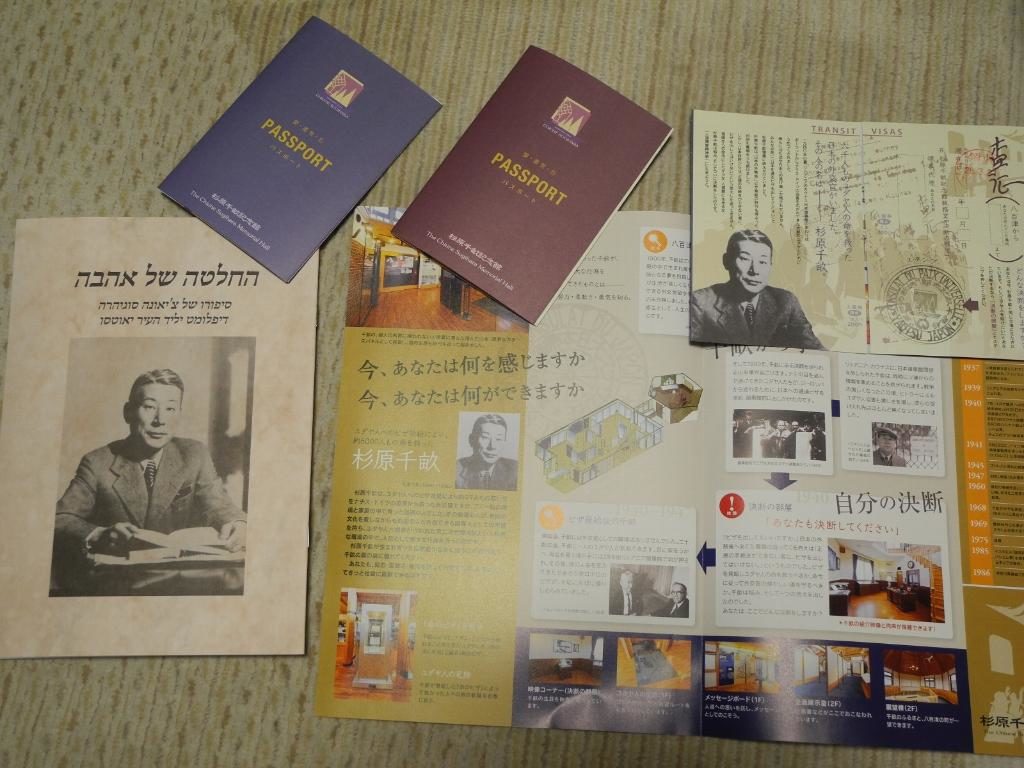
Chiune Sugihara, New York Jewish Travel Guide
The residents of Tsuruga’s port extended a heartfelt welcome to the sudden influx of Jewish refugees and engaged in a range of supportive actions. This included providing them with food and dedicating public baths solely for their use. This collective effort played a pivotal role in ensuring the safe passage of thousands of Jewish refugees to their ultimate destination, marking the final leg of their journey to freedom.
Additionally, it is crucial to recognize the contributions of two other individuals who played a significant role in rescuing these refugees: Jan Zwartendijk, the acting Dutch consul in Lithuania, and L.P.J. de Decker, the Dutch ambassador to Latvia. Despite the German occupation of their homeland since May 1940, both Zwartendijk and de Decker took considerable risks by issuing entry visas for Curacao, a Dutch colony in the Caribbean, without securing the necessary authorizations from the receiving end. Their efforts, though smaller in scale compared to Sugihara’s, were similarly courageous and impactful.
Being a humble and modest man, Sugihara never spoke about his wartime deeds to anyone, and the world remained largely unaware of him for nearly 30 years. It wasn’t until 1968 that Joshua Nishri, the economic attaché to the Israeli Embassy in Tokyo, managed to locate him in Tokyo with one of his survivors. This reunion held immense significance for Sugihara, as, over the years, he had been uncertain whether the visas he signed had indeed aided any refugees in escaping Lithuania. Learning that many people had found safety thanks to his actions brought tears of joy to Sugihara’s eyes, overwhelming him with a profound sense of satisfaction and happiness. He harbored no regrets, believing that even if only one life had been saved, all his hardships would have been justified. In the words of the Talmud, “Whoever saves a life, it is considered as if he saved an entire world.”
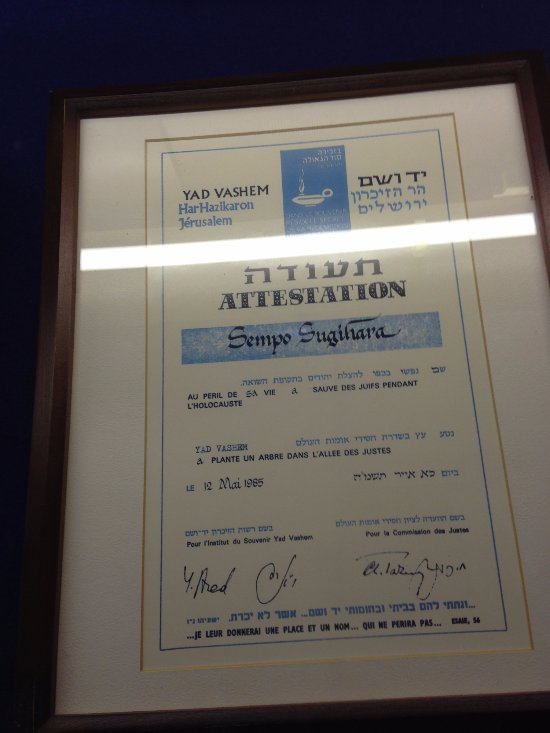
“Righteous Among the Nations,” a title by Yad Vashem, Chiune Sugihara, New York Jewish Travel Guide
Despite receiving widespread recognition in Israel and other nations, Chiune Sugihara remained virtually unknown in his own homeland. It wasn’t until a large international Jewish delegation attended his funeral that his fellow countrymen learned of his extraordinary altruistic deeds.
In 1985, Sugihara was honored as the sole Japanese recipient of the title “Righteous Among the Nations” by Yad Vashem, a prestigious award given by Israel and the Jewish people to non-Jews who risked their lives to save Jews during the Holocaust.
To commemorate his bravery, several tributes have been established: a monument was erected on a hill in Jerusalem, a cedar grove was planted in his name at Yad Vashem, and a park in Jerusalem was dedicated in his honor. Additionally, in June 2016, a street in Netanya, Israel, was named after Sugihara during a ceremony attended by his son, Nobuki.
Today, Chiune Sugihara is honored as a hero in Japan. The refugees he saved, known as “Sugihara Survivors,” have over 40,000 descendants, underscoring the profound and lasting impact of his courageous deeds.
For visitors to Gifu, Mr. Hiroshi Matsumoto, president of JTB (Japan Travel Bureau), has highlighted an itinerary called the “Tourism of Humanity.” This route features several key locations:
- Chiune Sugihara Memorial Hall: Dedicated to the principles of morality and peace, this hall offers a deep dive into the life of Chiune Sugihara. It showcases a variety of documents and artifacts related to his life and work, including an exhibit on the Holocaust. For the convenience of international visitors, the exhibits are available in both English and Hebrew.
- Replica of Sugihara’s Lithuanian Diplomatic Office: This replica provides an immersive experience of Sugihara’s office in Lithuania, where he issued the lifesaving “Visas for Life.” It helps visitors understand the historical significance of his actions.
- Chiune Sugihara Memorial Hall and Hill of Humanity Park: These sites have been established to honor Sugihara’s extraordinary achievements and to ensure that his legacy is preserved for future generations.
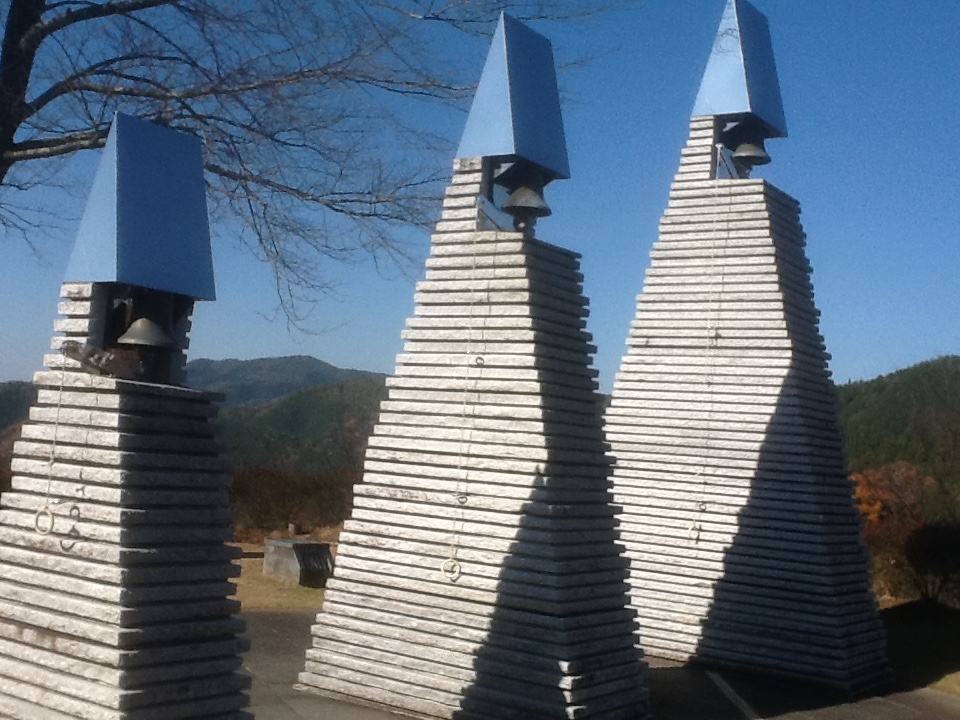
Hill of Humanity Park: A New York Jewish Travel Guide
The Port of Humanity Museum in Tsuruga offers visitors a comprehensive look at the history of Tsuruga’s port through informative panels and engaging videos. Within the museum, you’ll find a collection of articles and photographs documenting the experiences of approximately 6,000 Jewish refugees who escaped from Nazi Germany in 1940. These refugees held “visas for survival” personally issued by Sugihara, and the museum’s exhibits effectively conveyed their extraordinary narratives.

The Port of Humanity Tsuruga Museum – New York Jewish Travel Guide
As governor of Gifu Prefecture, Mr. Hajime Furuta has observed a recent surge in foreign tourists, particularly those interested in learning more about Chiune Sugihara. Visitors are also exploring and staying in renowned world heritage towns within the prefecture, such as Takayama and Shirakawa-go.
Mr. Ken Takashima from the Yaotsu Town Promotion Office reports a notable increase in Israeli and Jewish tourists, with over 15,000 visitors from around the world coming to Gifu, especially to visit sites dedicated to Sugihara’s legacy. Mr. Hiroshi Matsumoto, President of JTB (Japan Travel Bureau), mentioned that last year, Gifu Prefecture and JTB collaborated to honor Sugihara and promote his legacy globally. Their efforts included expanding tourism in Gifu through the “Tourism of Humanity” Chiune Sugihara route. As part of this initiative, information centers have been set up in New York City and Los Angeles.
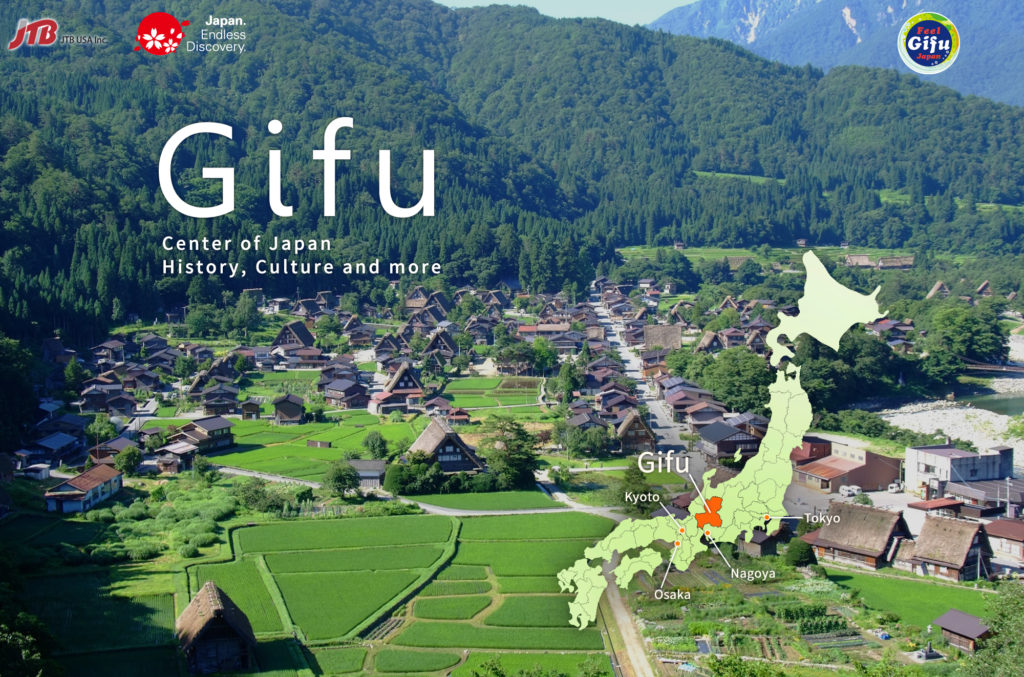
Gifu, Center of Japan: History, Culture, New York Jewish Travel Guide
In conclusion, Sugihara reflected in his 1983 memoir, “To be perfectly honest, I am convinced to this day that I took that path of action faithfully, putting my job on the line, without fear or trepidation in my heart.” He emphasized his commitment to saving the refugees, even at the risk of facing punishment. Driven by his deep personal conviction, Sugihara’s actions were guided by a profound sense of duty.
Today, Gifu officials are actively working to have Sugihara’s materials and documents, including the numerous visas he issued, included on the UNESCO Memory of the World Register. They believe his actions should be preserved not just as historical records, but as living memories that honor his remarkable legacy. Many hope that the inspiring story of this esteemed Japanese diplomat will ultimately be recognized and remembered across the globe.
For more details, you can reach out to the Gifu Prefectural Government or explore their website at:
This article was written by Meyer Harroch of the New York Jewish Travel Guide and New York Jewish Guide.
The author took part in a press trip hosted by the Gifu Prefecture and the Japan Travel Bureau (JTB).



You must be logged in to post a comment Login